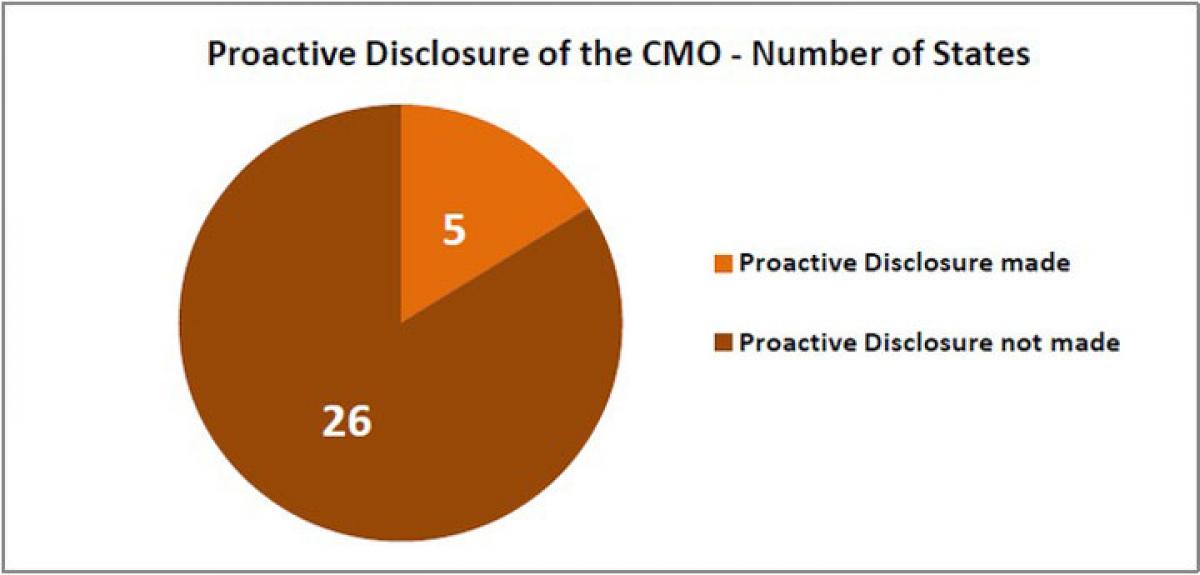Live
- Thanks to Centre, AP on fast-track mode
- First Impressions and Unboxing of the MacBook Pro M4: A Powerhouse for Professionals and Creators
- China Gears Up for Potential Trade War Amid Trump’s Tariff Threats
- Small Farmers Gain Less by Selling to Supermarkets: Study Reveals
- Why Despite the Controversy, America Is Anticipating the Mike Tyson vs. Jake Paul Fight
- Sanju Samson and Tilak Varma Shine: Record-Breaking Feats in 4th T20I Against South Africa
- India Urges $1.3 Trillion Annual Climate Support for Developing Nations
- Bad air: 106 shuttle buses, 60 extra Metro trips planned to make Delhiites give up cars
- WHO reports declining monkeypox cases in Congo
- CM Attends Kotideepotsavam on Kartika Purnima
Just In

The RTI act is now 10 years old. One of the most important provisions of the act is the proactive disclosure under Section 4. Even after 10 years, the PMO & several CMOs are guilty of not making proactive disclosure on their websites.
10 years on, only 5 CMs have made proactive disclosures under the Act
The RTI act is now 10 years old. One of the most important provisions of the act is the proactive disclosure under Section 4. Even after 10 years, the PMO & several CMOs are guilty of not making proactive disclosure on their websites.
The Right to Information Act (RTI) has completed a decade of its existence and even the Prime Minister acknowledged its role in bringing about a transformation in governance. One part of the RTI legislation that hasn’t attracted enough attention by the government is Section 4 disclosures.
It is disappointing to note that the highest seats of the power (PMO & CMOs) are themselves guilty of not implementing the RTI act. They are expected to stand as the right example to other departments and not the other way.
.jpg)
Despite repeated reminders by the Department of Personnel & Training (DoPT), many government departments are yet to implement Section 4 of the RTI act in toto. This Section mandates government departments (public authorities) to proactively disclose certain information, so that the need for filing an application would come down. Some of the information in Section 4 is immensely helpful to the common man.
Factly, the website for ‘Making Public Data Meaningful’, analysed the Section 4 disclosures made by the Prime Minister’s Office (PMO) and the various Chief Minister Offices (CMOs) since they are the highest seats of power in the country.
The PMO has a dedicated RTI page on the portal. This page has details of Public Information Officer (PIO), foreign & domestic tours of the PM along with expenditure, assets/liabilities of the Union Cabinet members, etc. But the Section 4 disclosures are absent on the PMO website.
Out of the 31 States/UTs, only 20 (65%) of them have a dedicated website for the CMO.Surprisingly, 11 (35%) States/UTs do not have a dedicated website for the CMO, including Punjab, Maharashtra, Delhi and Tamil Nadu.

Some CMs have personal websites, but do not have an official website for the CMO. It is surprising that even in this age of Digital India, the Chief Minister, who is the executive head of the state, does not have a dedicated website.
Out of the 20 States/UTs with a dedicated website, 12 (60%) of them do not have any information on RTI. States like Gujarat, Sikkim, Telangana, Madhya Pradesh, Chhattisgarh, West Bengal, Jharkhand, and Haryana are part of this list.
Only 8 states (40%) have RTI information on the CMO website, namely Jammu & Kashmir, Uttarakhand, Rajasthan, Uttar Pradesh, Bihar, Odisha, Karnataka & Kerala. Even taking those states into consideration that do not have a dedicated website for the CMO,
only 14 (45%) of them had RTI details of the CMO on the official government website. In other words, 6 states that did not have a dedicated website for the CMO still had RTI details of the CMO in some other government website.
Out of the 14 States/UTs with RTI details, only 9 of them (29%) had details of the Public Information Officer (PIO) and the Assistant Public Information Officer (APIO), the nodal officers in charge of RTI implementation in government departments.
Only 5 States (16%) had proactive disclosure of the CMO, on the website, as mandated under Section 4 of the RTI. These five states are Jammu & Kashmir, Punjab, Uttar Pradesh, Maharashtra and Karnataka.
Only in one out of every 6 States, the CMO has made proactive disclosure as mandated by the RTI act even after 10 years.Within these five states, Jammu & Kashmir and Punjab CMOs have made their disclosure only in English. In Maharashtra, the disclosure was made only in the local language.
In Uttar Pradesh and Karnataka, the disclosure was made in both English & the local language. The CMO of Uttar Pradesh does best as far as RTI disclosure is concerned.
The disclosures are detailed and are available in both English and Hindi. In the other 4 states that have made proactive disclosure of the CMO, some of the details are outdated.--
By:Rakesh Dubbudu

© 2024 Hyderabad Media House Limited/The Hans India. All rights reserved. Powered by hocalwire.com







